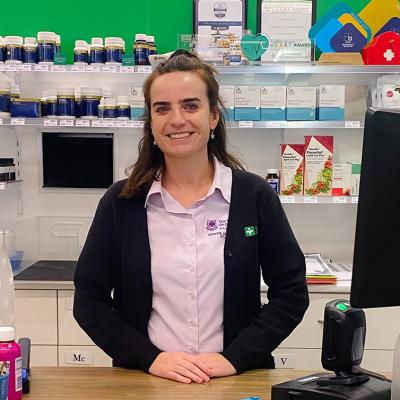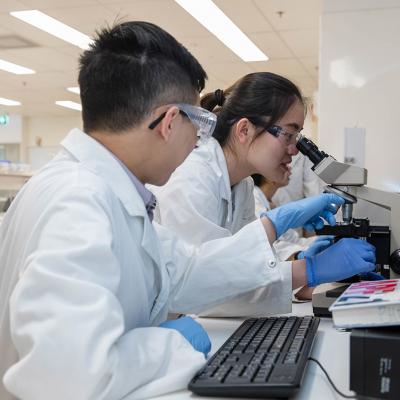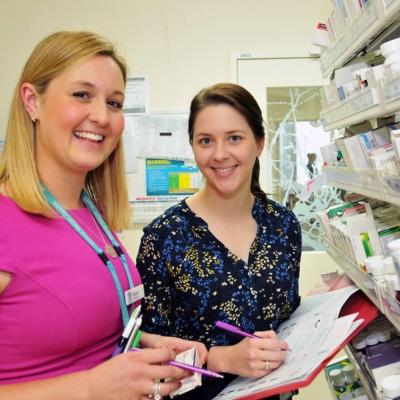Are you curious about the differences within pharmacy careers?
Recent UQ Bachelor of Pharmacy (Honours) graduate, Jordan Button, is a community pharmacist at Compounding Pharmacy Keperra. Kylie Mueller is a Senior Pharmacist at the Royal Brisbane Women’s Hospital.
They're here to shed light on the significant differences between a hospital pharmacist and a community pharmacist.
What is the role of a hospital pharmacist?
Kylie: The role of a hospital pharmacist is incredibly diverse. Hospital pharmacists are involved in every aspect of patient care, starting from medication reviews in the pre-admission clinic and extending to post-discharge care. They actively participate in ward rounds as part of a multidisciplinary team, contributing significantly to patient well-being.
Key responsibilities of a hospital pharmacist encompass, but are not limited to:
- medication history taking
- clinical reviews to identify problems presenting in patients, as well as clinical reasoning and decision making around medications
- risk vs benefit assessments to deliver patient-centred care
- counselling and education for patients and their families and carers, as well as other health professionals
- dispensing and checking medications
- communicating important information about patients and their medications to other health professionals.
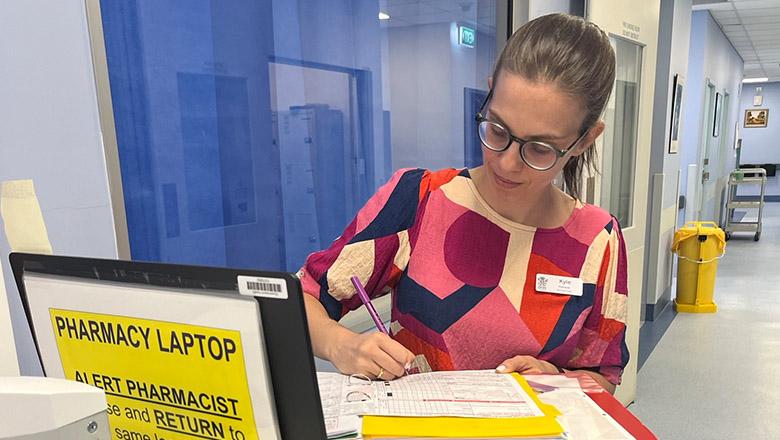
What is the role of a community pharmacist?
Jordan: In community healthcare, community pharmacists play a crucial role. They can refer patients to other medical experts when needed and provide important information about health conditions and medications to ensure patient safety.
The roles within community pharmacy include:
- offering medication counselling, including details on possible side effects, when and how to take medication, expected outcomes, and duration of treatment
- administering vaccinations, including COVID-19, influenza, Tetanus, Diptheria, and Pertussis, with more on the horizon
- dispensing medications
- providing guidance on minor ailments, such as over-the-counter medication suggestions and complementary or alternative remedies
- managing Opioid Replacement Therapy (QOTP) and National Diabetes Services (NDSS)
- customising or creating pharmaceutical drugs to meet the specific needs of individual patients.
What is a compounding pharmacy?
A compounding pharmacy is a regular retail pharmacy with the facilities to create specialised medications that are not commercially available and often not listed on the Pharmaceutical Benefits Scheme (PBS). Compounding involves tailoring medications for specific patients, with most pharmacies able to make simple creams that involve adding one or two active ingredients to a cream base.
At the compounding pharmacy where I work, we are able to form complex creams, suspensions, solutions, lotions, capsules (both slow release and immediate release), suppositories, troches and more, allowing for a range of treatments for conditions that may have many layers to them.
What kind of patients do you care for?
Kylie: In hospital pharmacy, our care extends to patients of all ages and medical conditions, ranging from paediatrics to geriatrics.
Every day presents me with the opportunity to support individuals with different medical needs, including those undergoing surgery, battling infectious diseases, receiving cancer treatment, managing burns, dealing with neurosurgical needs, or addressing chronic illnesses, mental health concerns, or sexual health conditions.
"The diversity of our responsibilities ensures that no two days are alike, making each one uniquely challenging and rewarding."
Jordan: In my role as a community pharmacist, I provide care to a wide range of patients.
On any given day, I may assist everyone from the elderly, children, young families, menopausal women, to individuals dealing with chronic conditions or intricate medical histories that require continuous treatment.
"Every day brings new challenges and opportunities to make a meaningful difference to the wellbeing of people within the community."
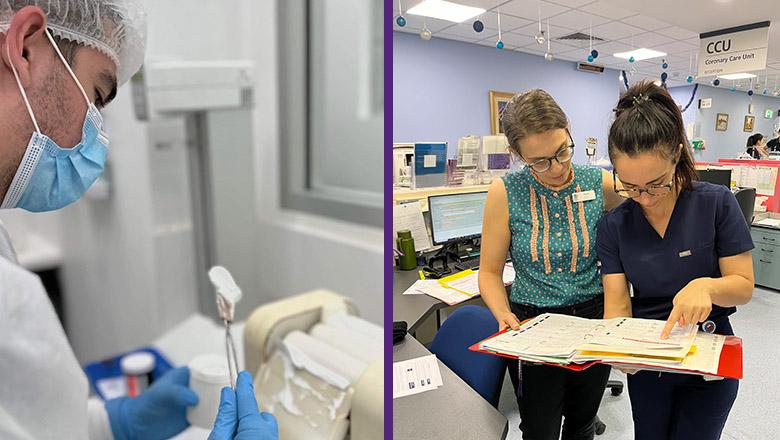
What kinds of people do you work with?
Kylie: In the hospital setting, I am an essential part of the multidisciplinary team. My roles involve collaborating with various healthcare professionals, including doctors, nurses, physiotherapists, occupational therapists, speech pathologists, social workers, psychologists, and ward staff. Together, we function as a united team, committed to delivering comprehensive care to our patients.
Within the hospital pharmacy, I also work closely with technicians, store personnel, and administration staff.
Jordan: As a community pharmacist, I work with other registered pharmacists and trainee pharmacists (those working in the pharmacy while completing their studies). We also have general retail staff who, by working with the pharmacists on staff, will be able to help some patients. We work with patient-centred people, who hold their needs as their priority.
What does your typical day look like?
Kylie: A typical day for a hospital pharmacist may look different depending on their role. For my days as a ward pharmacist, my day often begins with a team huddle to distribute workload. We will then head off to the wards where we will meet with the ward nurse unit manager or the team leader to discuss which patients will be going home and any urgent reviews that may be required.
Following this, we will prioritise who we will see first considering the patient, medication, and ward needs. Generally, patients who are discharging will be reviewed first followed by high-risk patients, new admissions, then general clinical reviews.
"In a perfect world, that would be what would happen, but this is healthcare and the key is flexibility!"
Jordan: My daily routine begins with an early arrival to set up our systems, followed by dispensing Opioid Replacement Therapy doses and opening the store, with a substantial portion of our initial patients being QOTP patients. As the day progresses, I greet patients, dispense prescriptions, and offer medication counselling. I also manage medications that were pre-ordered online and maintain accurate counts of Dangerous Drugs and QOTP medications.
Additionally, if patients request vaccinations, I administer them in the clinic room. I occasionally step into the front of the store to help pharmacy assistants, or assist individuals with specific needs, ranging from supplementation and first aid to addressing minor ailments.
Is pharmacy a good career in Australia?
Kylie: Pharmacy is an excellent career if you are interested in patient care. I think pharmacy is a job that is diverse, dynamic, challenging, evolving, and can lead to a variety of careers both within pharmacy and within the wider healthcare system.
Jordan: A career in pharmacy allows you the opportunity to follow many pathways such as research or running your own business. It’s also a career where experience and professionalism are rewarded. Pharmacists are an essential part of the healthcare system in Australia, and the profession will continue to grow. Pharmacists in Australia can now provide more services than ever before.
"The networking possibilities with other health professionals, and ability to specialise in whatever you want to, allows for the continued evolution of any given career, provided there is a drive to continue learning."


